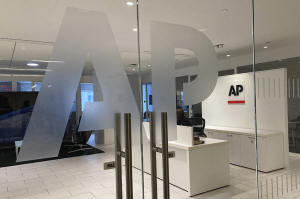AP wins reinstatement to White House events after judge rules government
can’t bar its journalists
[April 09, 2025]
By DAVID BAUDER
A federal judge ordered the White House on Tuesday to restore The
Associated Press’ full access to cover presidential events, affirming on
First Amendment grounds that the government cannot punish the news
organization for the content of its speech.
U.S. District Judge Trevor N. McFadden, an appointee of President Donald
Trump, ruled that the government can't retaliate against the AP’s
decision not to follow the president’s executive order to rename the
Gulf of Mexico. The decision, while a preliminary injunction, handed the
AP a major victory at a time the White House has been challenging the
press on several levels.
“Under the First Amendment, if the Government opens its doors to some
journalists—be it to the Oval Office, the East Room, or elsewhere—it
cannot then shut those doors to other journalists because of their
viewpoints,” McFadden wrote. “The Constitution requires no less.”
It was unclear whether the White House would move immediately to put
McFadden’s ruling into effect. McFadden held off on implementing his
order for a week, giving the government time to respond or appeal.
Shortly after the ruling, an AP reporter and photographer were turned
away from joining a motorcade with the White House press pool to cover
Trump’s appearance before the National Republican Congressional
Committee.
The AP has been blocked since Feb. 11 from being among the small group
of journalists to cover Trump in the Oval Office or aboard Air Force
One, with sporadic ability to cover him at events in the East Room.
“We are gratified by the court's decision,” said AP spokeswoman Lauren
Easton. “Today's ruling affirms the fundamental right of the press and
public to speak freely without government retaliation. This is a freedom
guaranteed for all Americans in the U.S. Constitution.”

White House press secretary Karoline Leavitt, one of the administration
officials named in the lawsuit, did not immediately return a message
seeking comment. In its action filed on Feb. 21, the AP sued Leavitt,
White House chief of staff Susie Wiles and deputy chief of staff Taylor
Budowich.
Many media outlets have been playing defense with this administration
Trump has moved aggressively against the media on several fronts since
taking office again. The Federal Communications Commission has open
lawsuits against ABC, CBS and NBC News. The administration has sought to
cut off funding for government-run news services like Voice of America
and is threatening public funding for public broadcasters PBS and NPR
for allegedly being too liberal in news coverage.
The AP had asked McFadden to rule that Trump's officials violated AP’s
constitutional right to free speech by taking the action because the
president and his staff disagreed with the words that its journalists
use. He had earlier declined AP’s request to reverse the changes through
an injunction.
Because of its wide reach, the AP has traditionally always been included
in “pools” for coverage of presidential events in places like the Oval
Office and Air Force One. McFadden cautioned that his ruling does not
necessarily herald a return to those days.
“The Court does not order the government to grant the AP permanent
access to the Oval Office, the East Room or any other media event,” he
wrote. “It does not bestow special treatment upon the AP. Indeed, the AP
is not necessarily entitled to the ‘first in line every time’ permanent
press pool access it enjoyed under the (White House Correspondents
Association). But it cannot be treated worse than its peer wire service
either."
The judge said that his decision does not prohibit a government official
from choosing which outlets to give interviews to, or choosing which
journalists’ questions they choose to answer at a news conference.

[to top of second column]
|

The Associated Press logo is shown at the entrance to the news
organization's office in New York on Thursday, July 13, 2023. (AP
Photo/Aaron Jackson, File)

“This is an important decision,” said Katie Fallow, deputy
litigation director at the Knight First Amendment Institute at
Columbia University. “The First Amendment means the White House
can’t ban news outlets from covering the president simply because
they don’t parrot his preferred language. “
And Floyd Abrams, a longtime free-speech attorney, cited American
history in his reaction: “What a splendid and well—deserved First
Amendment triumph. Thomas Jefferson and James Madison would be
pleased and relieved.”
Trump came out and said why he made the move
While there was little dispute in a March 27 court hearing about why
Trump struck back at the AP – the president said as much – the
administration said it was up to its own discretion, and not White
House correspondents or longstanding tradition, to determine who
gets to question the president and when.
Since the dispute with AP began, the White House has taken steps to
control who gets to cover the president at smaller events and even
where journalists sit during Leavitt’s briefings, saying both need
to better reflect changes in how people get information.
The AP’s decisions on what terminology to use are followed by
journalists and other writers around the world through its
influential stylebook. The outlet said it would continue to use Gulf
of Mexico, as the body of water has been known for hundreds of
years, while also noting Trump’s decision to rename it the Gulf of
America. Different outlets have used different approaches, some
skirting it by calling it the “Gulf.”
“For anyone who thinks The Associated Press’ lawsuit against
President Trump’s White House is about the name of a body of water,
think bigger,” Julie Pace, the AP’s executive editor, wrote in a
Wall Street Journal op-ed. “It’s really about whether the government
can control what you say.”
Testimony revealed AP’s coverage has been impeded
Trump has dismissed the AP, which was established in 1846, as a
group of “radical left lunatics” and said that “we’re going to keep
them out until such time as they agree it’s the Gulf of America.”
For a news organization that relies on speed as a major selling
point, the AP brought its chief White House correspondent and
photographer to testify March 27 before McFadden about how its
absence from covering certain events has delayed its transmission of
words and images. Its lawyer, Charles Tobin, said AP has already
lost a $150,000 advertising contract from a client concerned about
the ban.

The government’s lawyer, Brian Hudak, showed how AP has been able to
use livestreams or photos from other agencies to get news out, and
pointed out that AP regularly attends Leavitt’s daily briefings.
McFadden said in Tuesday's ruling in the case, Associated Press v.
Budowich et al, that the government has been “brazen” about why it
has excluded the AP.
“The government offers no other plausible explanation for its
treatment of the AP,” the judge wrote. “The Constitution forbids
viewpoint discrimination, even in a nonpublic forum like the Oval
Office.”
All contents © copyright 2025 Associated Press. All rights reserved |